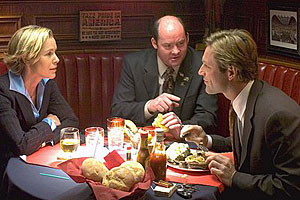The chief problem with “Thank You for Smoking,” first-time director Jason Reitman’s adaptation of Christopher Buckley’s satirical novel, isn’t that it’s over the top; it’s that it fits so neatly under the top. Aaron Eckhart plays Nick Naylor, a stunningly effective tobacco-industry lobbyist with a knack for wriggling from the grasp of even the most fervid anti-tobacco activists. Appearing on a talk show hosted by Joan Lunden (who appears as herself), Nick, the sole tobacco advocate on a very hostile panel that includes a bald teen who got cancer from smoking, asserts that it’s in the tobacco industry’s best interest to keep kids like this one from kicking the bucket. “If anything, we’d be losing a customer,” he says, applying his twisted logic so affably that refuting it would seem churlish.
Nick struts through life with bravado. He visits the grade-school class of his son (Cameron Bright) to tell the kiddies about what he does for a living: “It’s kind of like being a movie star. I talk for a living.” He winds up by saying — before he’s cut off by the teacher — “Instead of acting like sheep when it comes to cigarettes, you should find out for yourself.” In his off-hours, Nick hangs out with his cronies, an alcohol advocate and a gun advocate, respectively (they’re played by Maria Bello and the wonderfully cunning David Koechner): The three call themselves the MOD Squad — “MOD” stands for “Merchants of Death” — and compete to see whose field can claim the highest death toll.
“Thank You for Smoking” is a winking, inoffensive little movie that doesn’t demand deep inhalation. It walks a straight, unwavering line between being blatantly politically correct and disrespectfully politically incorrect — it baits no one, and thus risks offending no one. Despite its title, the movie doesn’t come packaged with a strong anti-smoking message, because it doesn’t need to: Everyone knows that smoking is bad for you, including people who continue to do it. The point of “Thank You for Smoking,” I think, is to cut a little window into the way the world works: There are some very wily sorts out there who can spin anything. They can be extremely entertaining, but they’re dangerous, too.
And — so what? Reitman (who also adapted the script) has fashioned a tastefully amusing little pantomime about our modern world. But I’m not sure what we’re supposed to take away from “Thank You for Smoking” beyond an appreciation for its hip two-step of cleverness. The picture is obviously a satire, but it has no sharpness, no sense of daring. It only occasionally gets us to laugh at things we know we shouldn’t laugh at (cancer victims, for instance). Mostly, it just leads us through the dance of things that we already know we should find funny, like the so-called irony of Nick’s being kidnapped by anti-smoking activists: They dot his body with nicotine patches and leave him lying, unconscious, in the arms of Honest Abe at the Lincoln Memorial.
The actors here are entertaining enough to watch, even if they sometimes seem to be taking their mission (whatever they think it is) a bit too seriously. Eckhart makes his lines snap, and J.K. Simmons, as Nick’s ruthless boss, B.R., vests his character’s booming aggression and underhandedness with a kind of Looney Tunes craziness. Rob Lowe — an actor who brings a light, self-mocking touch to nearly everything he does — shows up as a ruthless Hollywood wheeler-dealer. One of the movie’s wittier touches is the casting of William H. Macy as Birkenstock-wearing (with socks, no less) liberal Vermont Sen. Ortolan Finistirre, who, underneath his “conscience of the people” furrowed brow, is really a pretty nasty guy. He dresses down an underling for failing to find the “right” cancer victim for the Joan Lunden show: The kid should have been more pathetic, maybe in a wheelchair, Finistirre barks, “clutching a plastic bag with a goldfish in it.”
But beyond a few glimmers of inspiration, “Thank You for Smoking” is so evenhanded that it stamps out thought rather than provokes it. To be truly subversive, it would have had to address the fact that people love smoking. It is an addiction, after all, and smokers don’t smoke just to torment the clean-living types around them — they do it because it feels so damn good. While all of the ex-smokers I know are keenly aware of how dangerous the habit is, very few of them vilify the act of smoking, or the desire to smoke. If anything, they speak wistfully about their smoking days, remembering vividly how good it felt to draw all that tar and nicotine straight into their lungs. One of my favorite Southerners, asked if he regrets no longer being able to smoke, always quotes Paul Theroux on giving up pipe smoking: “I miss it like a dead friend.”
And there’s no greater poster boy for the love of smoking than Andy Garcia’s character in Kenneth Branaugh’s “Dead Again,” an ancient nicotine fiend whose longtime habit has done so much damage that he’s had to undergo a tracheotomy. Still, when a visitor comes to call, he begs, croaking through his electronic voice box, “May I please have a cigarette?” The obliging guest hands a lit one over, and Garcia holds the precious thing to the hole in his throat, sending “all those lovely, injurious tars and resins” (to quote Tom Ewell in “The Seven Year Itch”) straight to the core of his being. The look of bliss on his face is one of the sickest jokes in the movies, but it gets to the heart of why smokers love smoking, and why it’s so hard to quit. In comparison, Nick Naylor making a few wisecracks about a cancer kid is just playground stuff.

